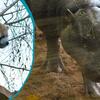A dozen large, breeding-age white-clawed crayfish have just been released into a privately owned ‘ark’ site in the Blackdown Hills . Wild Planet Trust have been working closely with Bristol Zoological Society, Nicky Green Associates, The Environment Agency and Blackdown Hills Area of Outstanding Natural Beauty to organise the release of this Endangered species, with the aim of creating a breeding group of the crustaceans in a safe waterbody or ark site.
Wild Planet Trust works with a number of organisations and local volunteers who survey the remaining locations of white-clawed crayfish in Devon on the Rivers Creedy Yeo and Culm to ascertain the status of the species. Alongside this work, a major part of the project is finding and developing ark sites for captive-bred crayfish to live.
White-clawed crayfish are the only crayfish native to the UK. They are listed as Endangered on the IUCN Red List, with threats mostly from non-native, invasive crayfish such as the American signal, which outcompete the white-clawed crayfish and carry a fungal disease – ‘crayfish plague’ – that is lethal to white-clawed crayfish. Populations are in decline and, unless action is taken, will disappear from Devon in the next 10 years.
The animals were captive-bred at the Bristol Zoological Society's crayfish hatchery and twelve of these breeding-age crayfish were released at the Devon ark site, an isolated water body secure from the invasive American signal. The date of the release coincides with the start of their breeding season, so there is hope that the population will begin to increase in the coming years. Further releases of younger crayfish are planned for this site in the future.
The release of these animals is a vital step to securing the future of white-clawed crayfish in Devon.
slot pulsaRelated Members
-
News
 Belfast Zoo helps to bring Christmas joy to Children’s Hospital 19th December, 2025Belfast Zoo joined the Lord Mayor of Belfast, Councillor Tracy Kelly, on Monday (15th December) to help bring festive cheer to the Royal Belfast Hospital…
Belfast Zoo helps to bring Christmas joy to Children’s Hospital 19th December, 2025Belfast Zoo joined the Lord Mayor of Belfast, Councillor Tracy Kelly, on Monday (15th December) to help bring festive cheer to the Royal Belfast Hospital… -
News
 Colchester Zoological Society welcomes new arrivals 19th December, 2025This December, Colchester Zoological Society (CZS) welcomed some exciting new arrivals! A young male pygmy hippo, Mikolas, from Zoo Dvur Kralove…
Colchester Zoological Society welcomes new arrivals 19th December, 2025This December, Colchester Zoological Society (CZS) welcomed some exciting new arrivals! A young male pygmy hippo, Mikolas, from Zoo Dvur Kralove… -
News
.png?w=100&h=100&zc=1&f=jpeg&hash=8d175f93cde920c5ba23c8ea7f92e55a) Blog: Understanding the human side of zoos 16th December, 2025Why are zoo researchers increasingly looking to social science? Dr Nieky van Veggel explains the significance of understanding the human dimension…
Blog: Understanding the human side of zoos 16th December, 2025Why are zoo researchers increasingly looking to social science? Dr Nieky van Veggel explains the significance of understanding the human dimension…


